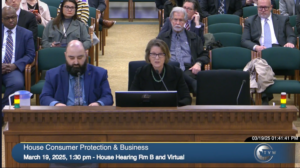
Washington OIC advocates for restitution authority, uniformity in fines
By onInsurance | Legal
Washington Insurance Commissioner Patty Kuderer once again spoke before the House Consumer Protection & Business Committee on a bill that would give the Office of the Insurance Commissioner (OIC) the authority to order restitution for consumers by companies or people committing illegal acts.
SB5331 also authorizes the OIC to fine property and casualty insurance companies up to $10,000 per violation rather than issue a total fine of $10,000, regardless of the number of violations.
The bill passed the Senate in early March and was passed to the House committee, which previously heard testimony from Kuderer on companion bill HB199. The companion bill was not moved out of the committee by its deadline, essentially killing the bill.
“This is commissioner-requested legislation that gives us authority to order restitution for consumers who have been harmed by the actions of insurance companies or agents and brokers and it creates uniformity in how we levy fines on all OIC regulated entities,” Kuderer said during Wednesday’s hearing.
She said it is an “excellent consumer protection” bill.
Kuderer added that the OIC doesn’t agree with proposed amendments to the bill that would allow for aggregated fines.
“That part of the bill is designed to create uniformity in how we levy fines at the OIC,” Kuderer said. “P&C insurers in 37 other states are fined on a per violation basis, so Washington State is an outlier. I understand the P&C insurers are concerned about excessive fines and want an aggregated cap. For excessive fines, there’s already four separate levels of judicial review to guard against abuse of discretion. And in terms of the aggregate fine, it’s bad for consumers and good for bad actors.”
Kathy MacCaul, Washington’s AARP advocacy director, testified in favor of the bill.
“Pretty frequently I get an email or a phone call from a consumer that something has happened related to their insurance,” MacCaul said. “And it has everything to do about the consumer and especially our vulnerable adults who signed some agreements that they don’t fully understand.”
MacCaul said the legislation is “valuable” to protect these consumers.
“We want to make sure that people, especially on fixed incomes, are not losing additional money from these types of insurance situations and scenarios,” MacCaul said.
Michael DeLong, Consumer Federation of America (CFA) research advocate, said CFA supports the bill.
“I believe that accountability for insurance companies is critically important in order for there to be a fair and functioning insurance marketplace,” DeLong said. “And if policymakers want insurers to obey the laws and the consumer protections that are passed by the legislature, companies need to behave well and they need to face meaningful consequences for any abuse they commit or any consumers that they overcharge or exploit. And so if they are harmed or defrauded of their money they need to get prompt repayments, especially consumers who are living paycheck to paycheck struggling to make ends meet.”
Kenton Brine, president of the Northwest Insurance Council, said he signed up to speak Wednesday as “other” because he isn’t for or against the bill. He did want to correct statements he previously said on the bill. This included a statement that insurance companies are already required to reimburse policyholders in addition to paying fines.
“This statement was not accurate,” Brine said. “Current law does not grant authority to the commissioner to require an insurer to reimburse policyholders. The statement should have reflected that under current law insurers may agree to consent orders that include fines in excess of the current statutory $10,000 limit, and also include reimbursement to policyholders. We apologize for any confusion that our previous statement may have caused committee members or staff and/or the insurance commissioner and the staff of the OIC.”
Kris Tefft, on behalf of the American Property Casualty Insurance Association (APCIA), said he also signed in as “other.” He said APCIA is asking for an amendment that would add an aggregated cap to the fines. APCIA also would support an amendment that distinguishes between willful and non-willful violations with a cap on both.
“This bill in its approach, we think, is somewhat undifferentiated,” Tefft said. “It doesn’t distinguish between willful, non-wilful. And fundamentally our policy concern is sucking in or pulling in the good actors into an enforcement regime with the bad actors.”
IMAGE
Washington Insurance Commissioner Patty Kuderer speaks before the House Consumer Protection & Business Committee on March 19, 2025/Screenshot
